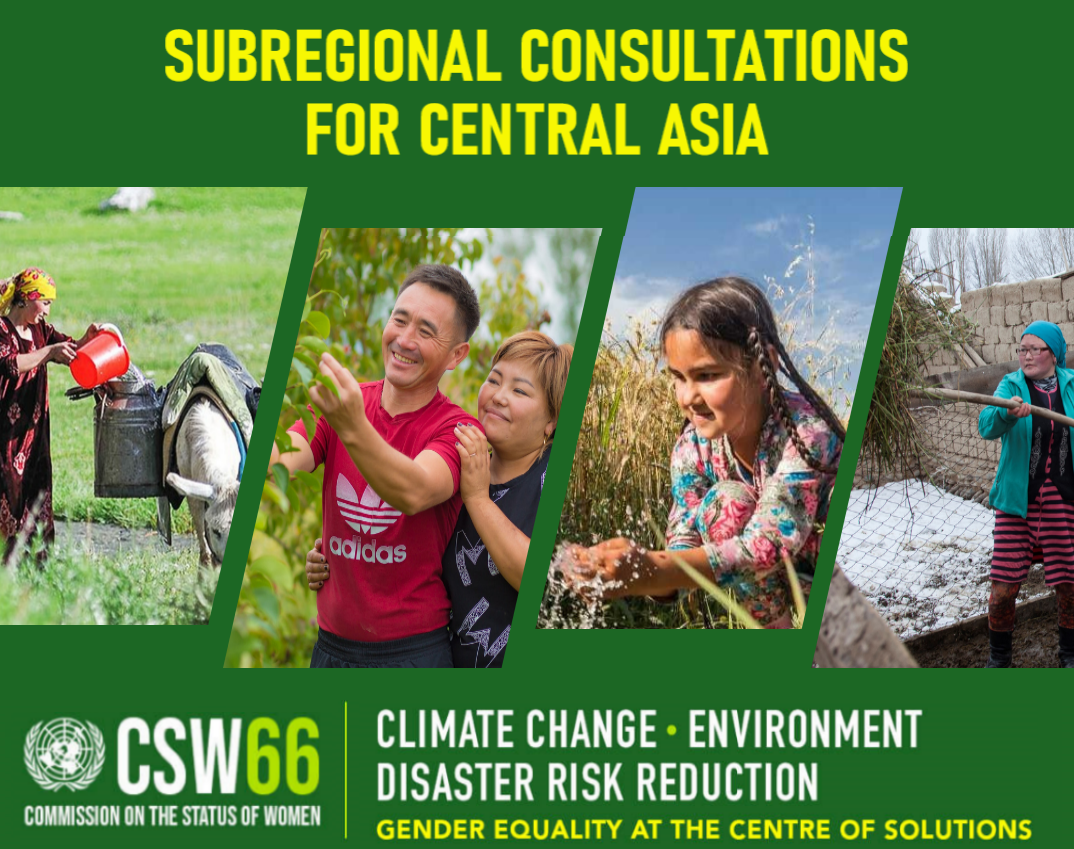Central Asian governments discuss the integration of gender equality into climate change policies
Date:

Ashgabat, 15 February 2022 - The Government of Turkmenistan and the UN Women Regional Office for Europe and Central Asia held today Central Asian subregional consultations to prepare for the sixty-sixth session of the Commission on the Status of Women (CSW).
This year the sixty-sixth session of the CSW will take up the theme “Achieving gender equality and the empowerment of all women and girls in the context of climate change, environmental and disaster risk reduction policies and programmes”.
During the online consultations, participants discussed climate change issues and its impact on women and girls in the region; exchanged best practices in the implementation of women-led projects that mitigate climate impacts and developed recommendations for concrete action on climate change, the environment and disaster risk reduction, which factor in gender equality and women’s active leadership and participation.
The consultations brought together representatives of national gender machineries, environmental management and disaster risk reduction institutions, members of parliaments, civil society organizations and youth representatives, gender experts, UNFCCC national coordinators, as well as research and analytical centers. The consultations were also attended by regional bodies and mechanisms - the Central Asian Women's Dialogue, the Center for Emergency Situations and Disaster Risk Reduction for Central Asia.
Climate change has a huge impact on Central Asia, a region highly vulnerable to natural disasters such as droughts, floods, earthquakes and landslides. According to the World Bank, natural disasters cost Central Asia $10 billion a year, affecting 3 million people in the region every year.[1]
As natural disasters continue to disrupt and threaten people's lives and well-being and undermine regional economic gains, it is clear that these risks disproportionately affect women and girls, who are the main providers of food, water and energy. “Central Asia cannot afford to miss out on the potential of women and girls in shaping solutions to the global climate change crisis. We need to recognize, value, support and fund their engagement and participation at all levels,” said Alia El-Yassir, UN Women Regional Director for Europe and Central Asia.
Gender norms and power structures play a critical role in how the challenges of climate change affect women and men differently. Women should be an integral part of the process of developing solutions aimed at mitigating the effects of climate change. Thus, empowering women to speak up, act and take leadership roles is a prerequisite for resilience, sustainable development and the achievement of gender equality and respect for human rights.
Gender issues and sex-disaggregated data on the impacts of climate change are missing from national policies on the environment, climate change and disaster risk reduction, including in countries prone to disasters.
Due to existing inequalities, as well as gendered roles and expectations, women and girls in the region have fewer resources to adapt to changing conditions:
- The average representation of women in national and global climate negotiating bodies in the Europe and Central Asia region is less than 30%;
- Unequal distribution of labor force is exacerbated by climate change when women care for family members whose health has been affected by environmental hazards;
- Many social and environmental factors affecting health, including women's reproductive health, have been adversely affected by climate change;
- Extreme weather conditions are reducing crop yields and agrobiodiversity in many parts of the world, making rural women particularly vulnerable in their daily lives (lack of income security);
- Climate change-induced water scarcity is forcing women and girls to travel long distances in search of water, increasing their time and health and safety burdens, including exposing them to greater risks.
The event aims to support Central Asian countries in preparing for the consultations of the sixty-sixth session of the CSW and discuss recommendations for life-changing actions on climate change, the environment and disaster risk reduction.
As a result, the UN Women Regional Office for Europe and Central Asia will develop a short summary of the discussions.
For more information, please contact Gulnaz Imamniyazova, Communications Specialist, UN Women Regional Office for Europe and Central Asia, [ Click to reveal ].